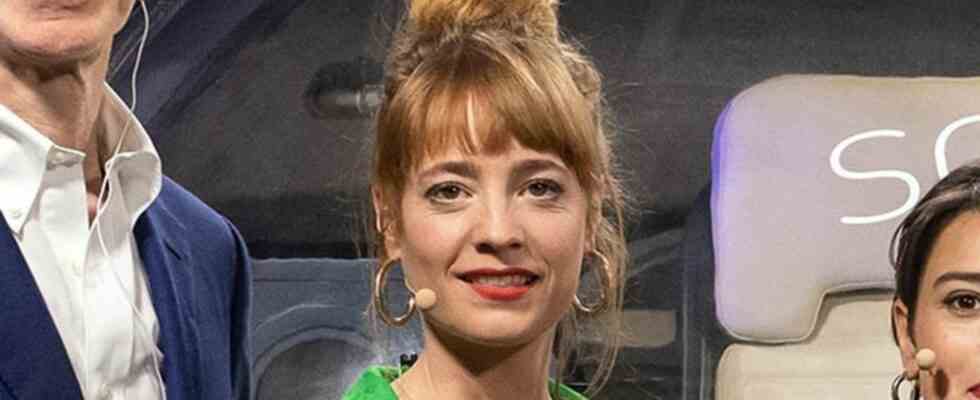“The swarm”
What Leonie Benesch found “chaotic” on the set
Actress Leonie Benesch is familiar with international sets.
© ZDF/Jens Gyarmaty
In an interview on the sci-fi thriller series “The Swarm”, Leonie Benesch talks about the “chaotic” shooting in a cast of twelve nations.
The eight-part, very darkly filmed science fiction thriller series “Der Schwarm” will be shown daily from Monday (March 6) to Thursday (March 9) from 8:15 p.m. in double episodes on ZDF. Leonie Benesch (31) plays one of the main roles. She embodies the young marine biologist Charlie Wagner, who, like many other scientists worldwide, is suddenly surprised by mysterious events from the depths of the oceans: whales destroy boats, deep-sea crabs invade beaches en masse, mussels paralyze container ships, Venice experiences a jellyfish plague, an ice worm dissolves Tsunamis and a deadly pathogen gets into the drinking water. Because it is becoming more and more dangerous, the scientists join forces. They discover an unknown species in the sea that is attacking humans…
The elaborate book adaptation based on the successful novel of the same name by Frank Schätzing (65) impresses, among other things, with a particularly large international team led by US producer Frank Doelger (“Game of Thrones”). Filming was also done at a variety of locations. For example, Benesch’s role at the beginning of the series is researching on a “very windy” Scottish island. The scenes were shot “in Apulia”, as she said in an interview with spot on news. She also revealed that even she was amazed at the Babylonian confusion of languages on the set – although she has already worked on many international productions such as “The Crown”.
Did you know the book by Frank Schätzing before the shooting?
Leonie Benesch: I read the book when I was 14 and then again for research reasons when I got the role.
The book template will be 20 years old next year. Why is this topic still relevant?
Benesch: Because you can easily imagine everything that happens in the book and film. I would even say that the issues of the environment, climate and energy transition are more topical than ever. This also shows that our species as sole ruler is not good for the planet.
Was Frank Schätzing involved in the shooting or in general?
Benesch: He was there once when we shot the underwater scenes in the studio in Brussels. But I wasn’t there that day. As far as I know, there was a lot of communication between him and the production, especially in the run-up to the adaptation.
How close is the series to the book?
Benesch: That’s pretty close, but of course there are a few changes.
What connection to the sea did you have before filming?
Benesch: I love water and I also really like being by the sea. I don’t like to swim laps, but I do enjoy splashing, snorkeling and scuba diving. But I also have a great deal of respect for deep water and what you can’t see in it. It’s also very easy for me to imagine something sinister. When I see the sea, I sometimes have to think of death when I think about how many people have died in it over the millennia.
Did the “swarm” change anything about it?
Benesch: Yes, but only when I read the book as a teenager. That was creepy.
The series “The Swarm” was shot with an international cast. You have already taken part in many international projects. What fascinates you most about it?
Benesch: With “The Swarm” it was really the case that the cast came from twelve different countries. I haven’t experienced anything like that before. With the other projects, there was always some sort of core cast that was from the same country.
What is it like behind the scenes with a project like this? After the shoot, do you mainly meet up with colleagues from your own country?
Benesch: No, because we all spoke good English. That was also our set language. In the evening we all talked in the language.
Was there a bizarre situation due to the many nations during the shooting?
Benesch: Many crew members, for example from the director and camera departments, came from Germany. Many other crew members were from Italy. The actors and actresses came from all over the world. And the set language was English… it got pretty messy at times. Especially when things had to be done quickly, we all had to be reminded from time to time to please only speak English.
Your character’s story begins on a windswept Scottish island. Could you imagine living all alone in a lighthouse on an island for a while?
Benesch: I could imagine that in the Scottish Highlands, for example. They’re beautiful.
Her career began with the Oscar-nominated film “The White Ribbon” (2009). When did you know you wanted to be an actress?
Benesch: I already had that in my head when I was 13. There was no specific trigger, but I saw “Gladiator” at the time and thought to myself: I’d like to die to a Hans Zimmer soundtrack too. But maybe it was the children’s circus that I took part in as a child. I’ve already discovered the Rampensau part in me.

